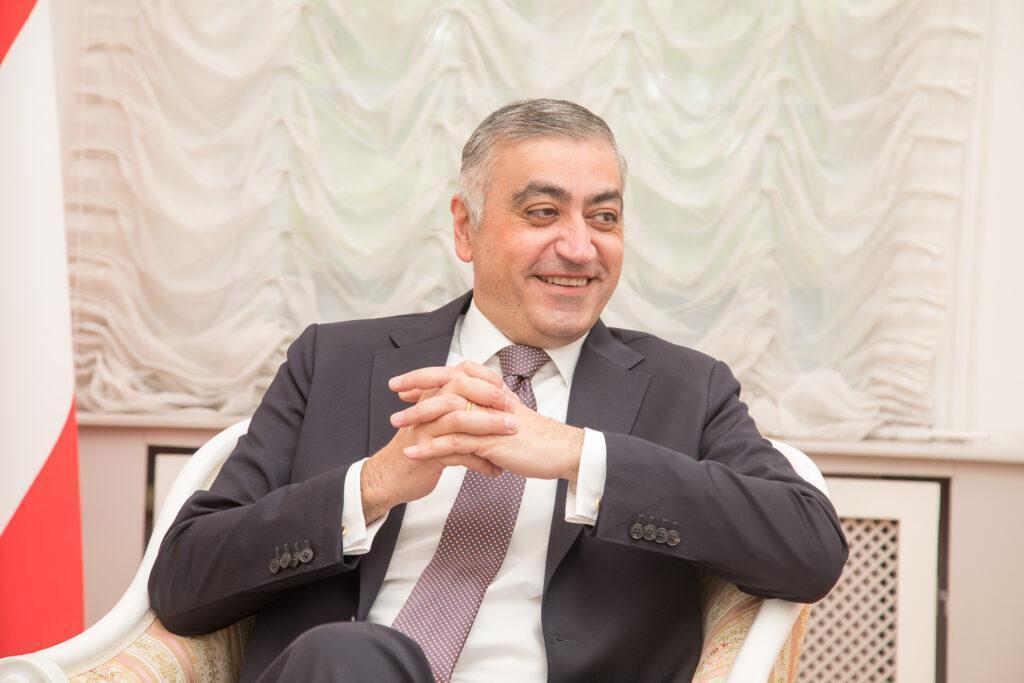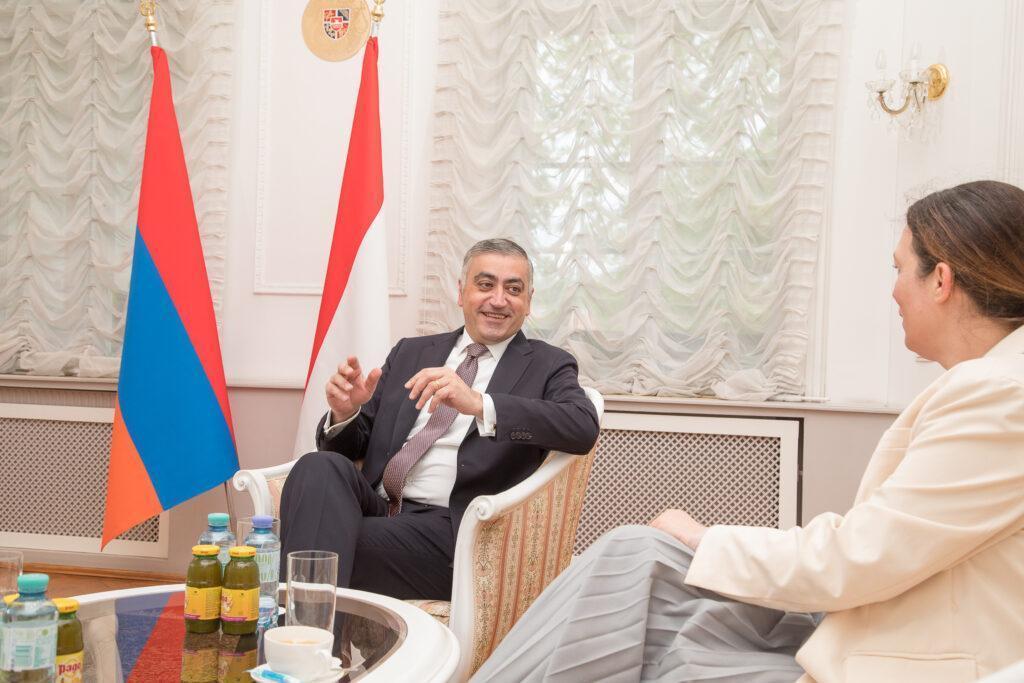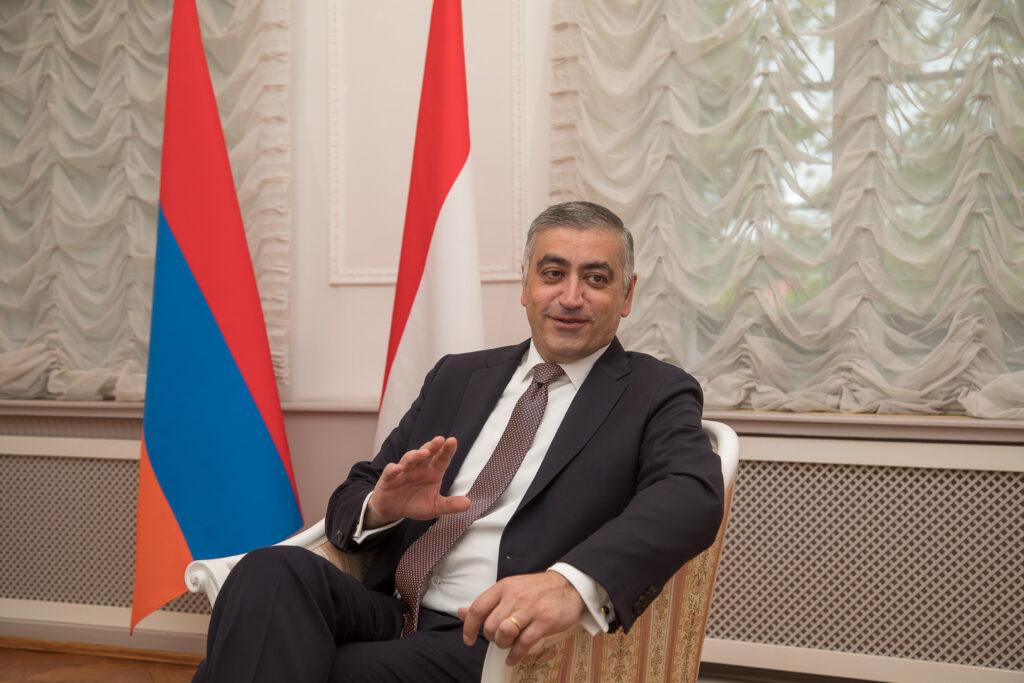In an interview with SOCIETY, H.E. Armen Papikyan, Ambassador of Armenia to Austria, talked – among others topics – about Austria’s and Armenia’s vibrant relations, the EU as a key partner and the current flare up of the Nagorno-Karabakh conflict.
Austrian-Armenian connections reach back hundreds of years – how would you characterize the current bilateral relations between the two countries?
I would describe the current bilateral relations between Armenia and Austria as vibrant and multi-faceted, deeply rooted in historical connections, based on mutual respect and shared values.
The historical ties between our peoples have facilitated cultural exchanges that continue to deepen our appreciation of each other’s traditions and are bound by profound friendship and cultural affinity between two nations.
Last year, we celebrated the 30th anniversary of the establishment of diplomatic relations between Armenia and Austria which has been marked by the visit of H.E. Alexander Schallenberg, Foreign Minister of Austria to Yerevan. Over three decades of interstate relations, our countries have laid a solid foundation for strong and trustful cooperation.
Armenia and Austria share fundamental values, including a deep commitment to human rights, democracy, and the rule of law. Together, we have actively collaborated within international organizations working hand in hand to promote common objectives.
Trade and economy remain a top priority for us in our bilateral relations. We cannot fail to see the existing important potential for further expansion and diversification of the bilateral trade volumes. Our governments have been actively supporting such endeavours through business delegations and joint initiatives to strengthen economic ties.
Austria’s commitment to support Armenia’s sustainable development is highly appreciated. The inauguration by H.E. Alexander Schallenberg of a full-fledged ADA coordination Office in Yerevan in 2022 will boost our relations and enhance cooperation in various fields.
In the field of education and research, Austria and Armenia have been collaborating on various academic and scientific projects. Student exchanges and scholarships have enabled young people from Armenia to study and conduct research in Austrian universities and institutions.
Armenia remains dedicated to fortifying and further enhancing the partnership with Austria for the benefit of our peoples.
The EU is a key reform partner in Armenia. How important is cooperation with the EU for your country? In which areas would you like to see further intensification of cooperation?
Cooperation with the EU holds great significance for Armenia. The legal basis of our partnership is the Comprehensive and Enhanced Partnership Agreement (CEPA) which entered into force on 1 March, 2021 and created a strong institutional framework for cooperation across various sectors.
The EU has provided valuable assistance in strengthening our democratic institutions, electoral processes, and governance structures.
Economically, the EU is an important trade and investment partner for Armenia. The trade turnover between Armenia and the EU member countries has been steadily expanding, generating new opportunities for our businesses and facilitating the integration of our economy with the European market.
The cooperation with the EU in the field of education and research is highly valued. The Erasmus+ program has provided valuable scholarships and exchange opportunities for Armenian students, academics, and researchers, fostering knowledge transfer and cross-cultural understanding.
We greatly value the support and partnership provided by the EU in various sectors and look forward to exploring new avenues of collaboration for the mutual benefit of Armenia and the EU.
We also highly appreciate the deployment of the EU civilian monitoring mission to Armenia earlier this year, with the primary goal of strengthening security and stability in the region.



The decades-long Nagorno-Karabakh conflict flared up again, with Azerbaijan blocking the Lachin corridor since December 2022. International media attention seems to be scarce. Would you wish for more international support?
Not yet recovered from the wounds of the atrocities of the war of aggression unleashed by Azerbaijan in 2020, the people of Artsakh (Nagorno-Karabakh) have been under an illegal blockade by Azerbaijan for more than five months, now having to face a dire humanitarian crisis.
Of course the limited attention from international media towards this alarming situation raises concerns. Increased media attention is crucial in raising awareness about the imminent risks faced by the people of Nagorno-Karabakh and is crucial in mobilising international pressure to reverse this precarious situation.
The blockade of Nagorno-Karabakh poses a significant risk considering Azerbaijan’s history of committing atrocity crimes. It violates all fundamental rights of the people of Nagorno-Karabakh, including freedom of movement, access to food, healthcare, education, right to work and other civil, political, economic, social and cultural rights. Azerbaijan also regularly cuts off electricity and natural gas supply, worsening the humanitarian situation for the population of 120,000. This policy of ethnic cleansing in Nagorno-Karabakh is aggravated by bellicose rhetoric and anti-Armenian sentiment prevalent at the highest levels in the public discourse in Azerbaijan.
By maintaining the blockade and establishing an illegal checkpoint in the Lachin corridor, Azerbaijan flagrantly disregards the legally binding order issued by the International Court of Justice on 22 February 2023, which explicitly demands that Azerbaijan ensures unimpeded movement of persons, vehicles and cargo along the Lachin Corridor in both directions. Azerbaijan’s actions demonstrate a complete disregard for its international obligations under international law, including international humanitarian law.
Azerbaijan’s policies towards the people of Nagorno-Karabakh are accompanied by its aggressive actions against Armenia. Since May 2021, Azerbaijan has occupied more than 150 sq kilometers of the sovereign territories of Armenia through different stages of aggression, with the largest occurring in September 2022. These actions have been marked by war crimes and severe human rights violations committed by the Azerbaijani armed forces.
Vigorously enforced robust international guarantees are essential in restraining Azerbaijan and compelling its authorities to respect its own commitments, to refrain from aggression against Armenia and the policy of ethnic cleansings in Nagorno-Karabakh.
Armenia remains committed to peace and will persist in its endeavours to seek a lasting resolution to the conflict and normalization of relations between Armenia and Azerbaijan in pursuit of establishing sustainable peace and security in the South Caucasus.
You are the Permanent Representative of Armenia to the OSCE – how would you define Armenia’s role within this organization? How important is a membership for your country?
I would define Armenia’s role within the OSCE as active, constructive, and committed to promoting regional security, cooperation, and the principles of the OSCE.
OSCE provides an important platform for dialogue and cooperation across its three dimensions – the politico-military, the economic and environmental, as well as the human dimension.
Armenia has been engaged in the negotiations under the auspices of the OSCE Minsk Group Co-Chairmanship, aimed at finding a peaceful resolution to the Nagorno-Karabakh conflict. Through its participation in this framework, Armenia has demonstrated its commitment to diplomatic efforts and the principle of peaceful resolution of conflicts.
Armenia actively contributes to the OSCE’s work in promoting human rights, democracy, and the rule of law. Our country has been engaged in exchanges of best practices within the OSCE related to electoral processes, media freedom, and protection of minorities.
Membership in the OSCE also allows Armenia to engage in multilateral dialogue on a wide range of security-related issues, including counterterrorism, arms control, confidence-building measures, and the promotion of comprehensive security in the OSCE region.
Amid the range of serious challenges that the OSCE currently faces, concerted efforts are required to overcome the erosion of trust and increasing tensions between participating States. It is essential for the OSCE to adapt and strengthen its mechanisms to address these challenges, foster trust-building measures and ensure the organization’s effectiveness in today’s complex security environment.

